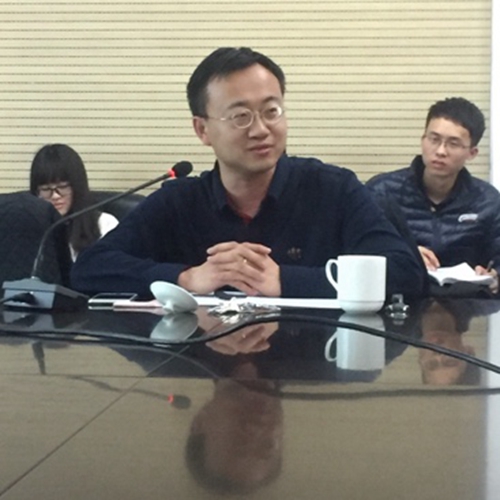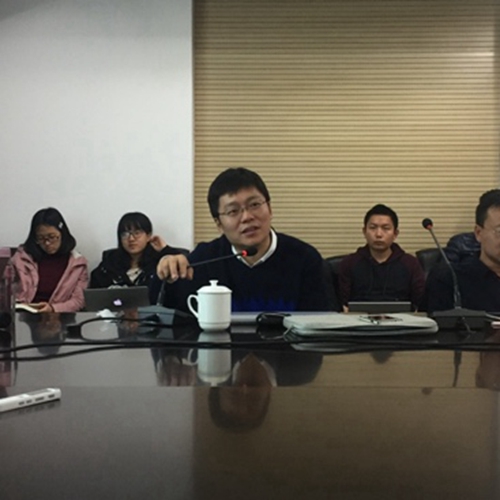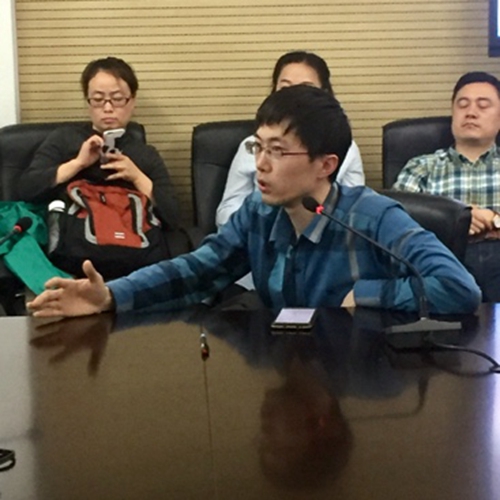"Cyber Crimes and Prevention of Criminal Law" Held Successfully
Date:2017-04-03
At the evening of March 20,the lecture “Cyber Crimes and Prevention of Criminal Law” was held successfully in Room 303, Koguan Building, PKULS. The lecture was delivered by He Ronggong, the Prof. of Wuhan University and managing director of Chinese Criminal Law Research Association. Prof. Lao Dongyan from THULS and A.P. Jiang Su from PKULS are guest speakers, while A.P. Che Hao from PKULS was the host. The lecture focused on the "Cyber Crimes and Prevention of Criminal Law",which attracted many scholars, students and the community to attend.

After a piece of enthusiastic speech and introduction by A.P. Che Hao, the lecture began.

Prof. He Ronggong, from the perspective of cyber crimes, introduces his views and reflections on the prevention of criminal law from five aspects. First, the emergence of the prevention of criminal law: the modest image of the criminal law is undergoing structural changes. As a result, the prevention of criminal law came into being. Compared with the classical criminal law, it is no longer strictly stressed that the basis of guilt, but focus on the future and security, pay attention to guard against potential legal harm. Second, Prof. He Ronggong pointed out that the prevention of criminal law began to become China's legislative policy, and reflected in the specific provisions: "Amendment Ⅷ to the Criminal Law " and "Amendment (IX) to the Criminal Law " put prevention as guiding ideology of legislation and criminal policy; in specific terms, the provisions on the crime of terrorism also reflects the concept of criminal prevention. Third, Prof. He Ronggong introduces legal issues exists in the prevention of criminal law from the perspective of cyber crimes. In contrast to the principle of "safe harbor" and "red flag" in civil law, Prof. He has deeply analyzed the legal problems existing in the current criminal law on the provisions of cybercrime. He pointed out that whether the network service provider, or the internet access provider, server hosting and other technical supporters, which are engaged in commercial business activities, the status of the guarantor in the criminal law and the resulting obligations are very thin, even hard to be sure. And the current provisions that refusal to comply with the information network security management obligations and help the crime activities, reflected the safety priority free values ??in the network field, which has gone beyond the scope of criminal obligations of citizens in free countries. Fourthly, Prof. He further analyzed the legal risk prevention of criminal law. The emergence of the prevention of criminal law is a reasonable response to the modern social needs, but we must be vigilant of the positive view of criminal legislation, adhere to the modesty of criminal law, under the condition that judicial and legislative present are expanding tendency.Fifth, Prof. He has made a summary and prospect for the prevention of criminal law. He suggested that the prevention of criminal law and the dark policy for the development of criminal policy may be the inevitable direction of the future criminal law. The real risk lies in the digestion of the rule of law foundation. In the case of the rule of law has not yet established, we are afraid to bear such a rule of law deconstruction.
In the following part of the review, Prof. Lao Dongyan and A.P. Jiang Su gave a high evaluation firstly on Professor He's excellent report, and then talk about their own views on the topic of prevention of criminal law.

Prof. Lao Dongyan believes that, first of all, when it comes to the prevention of criminal law, social change needs to be considered. Prevention of criminal law focuses on the future and security issues. From legislation to judicial, from domestic to international, the development of criminal law recent years reflected this trend. The serious consequences of cyber crime also indicate the social needs for the prevention of criminal law. We can not just look at the current problems with the free criminal law in nineteenth Century. Secondly, she pointed that there are some problems with current criminal law system in the face of the impact of prevention of criminal law. The patched legislation, trapped in the traditional control thinking, lack of rights guarantee and so the problems still need to be solved and improved. Finally, Prof. Lao Dongyan talked about her own views on the idea that the criminal law should deal with the current problems. The basic idea should be changed from the control idea to the guarantee mentality, including the following: the purpose of prevention is integrated into the construction of the criminal law theory system; update the concept of explanation considering the purpose and effect of prevention; the control on the prevention criminal law is reasonable and constitutional; introduce the type of thinking and divide the traditional cybercrime with the new type of cybercrime.

A.P. Jiang Su basically agreed with Prof. He Ronggong's judgment on the basic trend of criminal law. He suggested that despite the existence of the prevention in traditional criminal law, such as to make punishment on preparatory crimes, but still insist on free for the first choice, the security value of secondary. However, in recent years, preventive factors in traditional criminal law have changed from individual existence to structural features. There is a profound background behind this shift. The threat of a new type of crime needs to be dealt with by the legislator, but more factors should be considered at the same time. There is no doubt that our society is a modern society, but in the system, there are many pre-modern social characteristics. Under this special legislative stage, classical liberalism on the boundaries of the penalty limits can provide us with a good answer. So we need to rethink and explore from the macro perspective and the re-enlightenment of criminal law.

Subsequently, A. P. Che Hao made a summary to the lecture. He praised the intriguing reports and the gem review. He pointed out that the development of criminal law can not be confined to the doctrine, the concept of advocacy and Enlightenment in social progress. As a scholar, he put forward at the same time, the influence of discourse relies on logic and reason, and on this basis, and he expressed his views to make a further improvement on the part of what Prof. He’s report.

In the part of communication, the audiences asked questions about the necessity in practice and rationality in the norm of cybercrime. Prof. He answered the questions one by one and made a heated communication with students. Prof. Lao Dongyan and A.P. Jiang Su expressed their views as implement.
Finally, in the warm applause, Prof. CheHao expressed his gratitude to Prof. He Ronggong, Prof. Lao Dongyan and A. P. Jiang Su again. The lecture was successfully concluded in a warm and serious academic atmosphere.
Translated by: Yang Xiaoxiao
Edited by: Yang Wanyi



